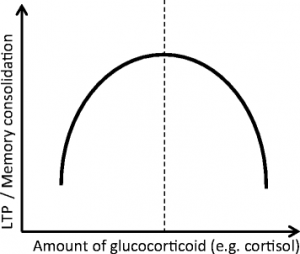
Can you remember the last time you were in a high stress situation? Perhaps it was before a major test, or the last time you had to speak in public. We can all relate to that heart pounding and nerve-wracking feelings that seem to grip your entire body. I like to use the example of walking up to bat in a key situation in a baseball game. You feel the anxiety and your heart pounding with every step as you inch move closer to the plate. You step up to bat, zone in, and do your best to perform at your highest level.
After not only this event, but any anxiety provoking situation is over some unique and fascinating things happen with your memory. Regardless of the outcome, If you’re like me sometimes you walk away and remember every vivid detail. On the other hand sometimes you walk away, especially when you’re really feeling excess pressure, and you say to yourself, “what happened out there? I can’t remember a thing it all just happened so fast”. Interestingly, there is neural evidence supporting this phenomenon, and a wealth of information exists on how your memory if affected by anxiety provoking situations.
Spatial episodic memory is enhanced
This type of memory refers to your ability to remember what you saw, heard, and what happened. The main stress hormone cortisol floods into your brain’s memory center causing increased brain activity when faced with a stressful situation. This increased activity helps you bring together the information into one, coherent story. Overall, this type of memory Memory consolidation, is increased when stress is added.
Memory recollection is hindered
Wait a minute, if your ability to form memories is stronger how can your ability to remember them be weaker? Although these memories are stronger, they are a little harder to get at. This is a protective mechanism caused by the coding of these events in the first place. The same activity that helps encode these memories simultaneously hurts retrieval. You don’t want to relive the stress of these events over and over and have them be at the forefront of your thoughts at all times. In fact, there is evidence that when this process is chemically imbalanced, and these memories are played on repeat in the brain, there is a higher risk for PTSD.
Working Memory is hindered
Most parts of your memory are improved when stressed, but your working memory is hurt. Working memory is your ability to take in new information and use it in an ongoing task. The fact that working memory is hindered fits with that feeling of being “zoned in”. If you are only working on one thing this is your brains way of telling you to focus on this one important item and ditch the rest.
How much stress is too much?
Now this is where that feeling when you walk away from the event and say, “what just happened out there”. When your brain is flooded with too much cortisol (stress hormone) s your memory is hindered. This process follows the curve shown below. Some stress is good and improves your memory as it follows a curve leading up to ideal consolidation. However, there is a point where this consolidation begins to slope down and increased stress/cortisol has an adverse effect.

Memory as it relates to stress and anxiety is a complicated process with enough neuroscience to make your head spin for years. The next time you find yourself in a stressful situation, maybe take a second to take a deep breath, find your ideal between Zen and freaking out, and thank your memory for zoning in and helping you function at your highest level.